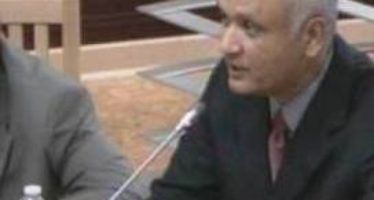Audit By Invitation Only
SEPT. 24, 2010
With the City of Bell scandal fresh on the minds of nearly everyone in the state who pays taxes, legislators are now questioning the exorbitant salaries and benefits some local governments are paying in order to prevent such compensation abuses from ever happening again. Some say this an ethical issue, but as is the case with common sense, it’s not something that can be legislated.
A joint hearing of the Accountability and Administrative Review, and Local Government committees was held Wednesday to discuss how to manage the compensation by cities, counties and municipalities.
Committee Chairwoman, Assemblywoman Alyson Huber, D-El Dorado Hills, said that the Legislature last discussed local government compensation way back in 1987. “It’s not just Bell; there are holes in transparency,” said Huber. She said that the state can and should take measurers to prevent this abuse from happening in the future.
Along with state Auditor Elaine Howle, the state Controller’s office sent three representatives to answer questions. Huber asked, “How did this happen in the first place, and whose responsibility is it?”
John Hiber, Chief Operating Officer for the Controller, set the tone with his artful dodge: “That’s a broad question – the situation in Bell is complicated. We don’t have the jurisdiction.”
The heavy sigh from the audience members was palpable, as were the elevated whispers and comments.
“I find it unbelievable that any auditor wouldn’t recognize funds in wrong accounts,” said Assemblywoman Joan Buchanan, D-Alamo. “Any auditor should have been able to pick it up.”
When one of the Controller’s representatives responded by saying, “We’re in the middle of the quality control review and are not at liberty to discuss,” Huber let the comment slide.
But the hearing finally took an interesting turn when Assemblywoman Audra Strickland, R-Camarillo, fired off the questions that were on everyone’s mind. She directed her inquiry to John Hiber, the Chief Operating Officer for the Controller.
“What authority and jurisdiction did the Controller’s office use to get information from cities?” she asked.
“Current state code supports the request of information from cities,” Hiber responded. “The Controller must wait to be invited by a city or county in order to do an audit.” He had mentioned this earlier in the hearing, but legislators did not respond. And now Hiber opened up a can of worms.
Strickland fired back. “Does the Controller need an invitation to conduct an audit?” she asked. “Don’t you have statutory authority? What type of jurisdiction or authority do you need to do this?”
“The Controller’s office will present requirements to the legislature during the next session,” Hiber said.
Strickland was incredulous. “What do you do with information when it sends off a red flag?” she asked. “Do you just regurgitate the information, or are checks and balances in place?”
After agreeing with her that “there needs to be more oversight,” Hiber said that the Controller’s office had been invited by other cities and counties in to do audits, as if this was standard practice.
This clearly didn’t satisfy Strickland. She then asked Hiber about the enormous salaries and compensation raked in by Bell’s City Manager and other employees.
Huber then abruptly cut Strickland off. “I think eight questions is quite enough,” she said.
Undaunted, Strickland emphatically asked the Controller’s office representatives, “Were the reports accurate?”
“All of the information we received (indicated that) we didn’t have adequate staffing to do complete analysis,” one of the Controller’s representatives said.
The game show atmosphere of the hearing was aggravating. The very serious problem of some local governments paying themselves huge salaries and benefits, then ducking beneath the Controller’s office radar, is mind boggling.
What other cities are being examined, and who in the Controller’s office is authorized to act on this? Where was the CalPERS oversight board or the Treasurer’s office? These governing bodies have controls and procedures in place to have caught the 47 percent salary increases in Bell, but no one noticed? Long time experts work in these departments; did they see irregularities, or were their reports filed away? And how could the abuses in Bell go on for so many years without anyone in the state saying something?
The excuse “we just collect the reports,” is falling on deaf ears. The local government hearing was supposed to answer the question of how and why the city of Bell, and the city of Vernon before it, illegally taxed citizens to pay for outrageous compensation. But it appears to have been another exercise in futility; another grandstanding effort by this Legislature.
Strickland was asking the right questions, as were Assembly members Buchanan and Nathan Fletcher, R-San Diego. Concern about Bell is a bipartisan issue, but state officials still aren’t answering the how and why questions.
California will continue to endure these scandals until the people of the state start demanding change. We know the initiative won’t come from the Legislature, especially during election season.
-Katy Grimes
Related Articles
Pension escape routes being cut
AUGUST 30, 2010 I’ve frequently argued that, as the state faces an unfunded pension liability that’s as high as $500
New speaker's FPPC troubles
Feb. 16, 2010 By ANTHONY PIGNATARO One of John A. Perez’s first acts as a state assemblyman was to introduce
Speaker Perez’s spokesman behind Optometrist ads
An optometrist by profession, as well as Former president of the California Optometric Association, Sen. Ed Hernandez has authored SB 492,



